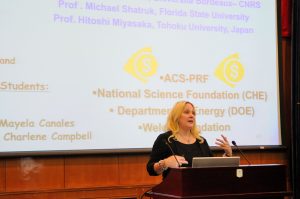Dunbar Research Group Conducts Valuable Chemistry Research, Founded by Kim Dunbar


Kim Dunbar on Her Research Group, Which Emphasizes Coordination Chemistry
The Dunbar Research Group is based in College Station, Texas, at Texas A&M University. The director of the research group is Kim Dunbar, an accomplished chemist who has received many awards. The Dunbar group conducts research in the area of inorganic chemistry, with an emphasis on coordination chemistry.
“We strive to elucidate the relationship between molecular structure and physical properties in each specific application of our research,” Kim Dunbar said.
The research the Dunbar group conducts is varied, ranging from topics of molecular magnetism, anti-cancer compounds and multifunctional materials with organic radicals. “The variety of goals for our research provides the students in my group with the opportunity to expand their chemical knowledge outside the boundaries of their specialty,” said Kim Dunbar.
Students in the Dunbar group gain experience in a wide variety of techniques and instrumentation, including air-free synthesis, X-ray crystallography, SQUID magnetometry, mass spectrometry, computational chemistry, cell viability assays, electrochemistry and electronic, EPR, infrared and NMR spectroscopies.
Currently, the group has a visiting scholar, two postdoctoral research associates, nine Ph.D. students and two undergraduate students. Professors and scholars have been part of the Dunbar Research Group since 1994. The group participates in numerous outreach events, including a chemistry open house and a science Olympiad, which gives students an opportunity to share their work with others at the university, according to Kim Dunbar.
The research of the Dunbar Research Group has been funded over the years by the National Institutes of Health, Department of Energy, the National Science Foundation, the American Chemical Society Minority Scholars Program, and the Welch Foundation, among others. To find out more about the research the group is doing, visit http:/dunbar.tamu.edu.
Kim Dunbar, the founder of the research group, received a Ph.D. in inorganic chemistry at Purdue University. She is a University Distinguished Professor and holds the Davidson Chair of Science in the chemistry department at Texas A&M University. Kim Dunbar has been given numerous awards for her teaching and research over the years. Some of these include an Alfred P. Sloan Fellowship, Sigma Xi Research Award, Distinguished Alumni Award from Westminster College, Purdue University Distinguished Alumna Award , the 2015 Americn Chemical Society Award for Distinguished Service in the Advancement of Inorganic Chemistry sponsored by Strem Chemicals, and the 2019 Basolo Medal for Outstanding Research in Inorganic Chemistry. The Basolo Award, presented annually by Northwestern University, is co-sponsored by the American Chemical Society Chicago Section and named for the late Northwestern chemist Fred Basolo, who was the Charles E. and Emma H. Morrison Emeritus Professor of Chemistry and served as president of the ACS in 1983 Kim Dunbar has also been featured alongside other prominent women in science, including Marie Curie, in Angewandte Chemie on Women in Chemistry (2011). At Texas A&M University she is the first woman in the College of Science to be named a Chaired Professor.
Kim Dunbar’s research in synthetic and structural inorganic chemistry is focused on the use of coordination chemistry to establish structure/bonding/property relationships in molecular materials and in metal-based drugs. She is the author of over 420 publications. Her experimental and theoretical work to understand physical and chemical phenomena have redirected and focused the work of other researchers in her field.
